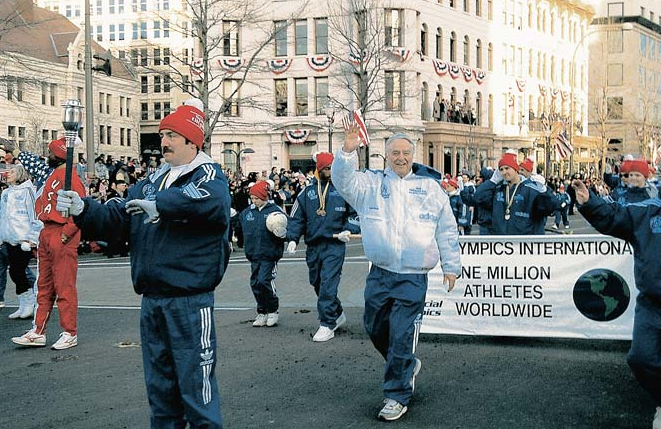WASHINGTON D.C.—Recently on a transcontinental airplane flight, a lady was enjoying a magazine while I looked out the window. She asked me, for whatever reason, “What do you think are America’s greatest challenges?” For a moment I thought about our economic issues, which are improving. Then I thought of the national debt, but soon I answered, “It’s subtle racism and Alzheimer’s.” She thanked me for my answer. Then I realized the answer was a bit too heady for someone who seemed to be already jittery about flying by plane. Alzheimer’s was on my mind because a longtime and beloved friend, Sargent Shriver, had just passed away from the horrid disease.
Not only had a man who once stood as an academic giant, a political force in an era of the world’s greatest needs, passed away, but the dreaded disease of Alzheimer’s had robbed his family, himself and me of a man who had always been so kind and generous to everyone. He was generous with his opinions, his advice, his time and just his amazing presence; all of that was what we loved about him. Not since meeting movie icon Lana Turner had I been as awestruck by such a gentle soul, who had such a grand presence to those who knew him. Sargent Shriver embraced me and always made me feel as if I was part of his family from day one. His wife Eunice Kennedy Shriver made you feel honored to be in her presence, but she demanded good behavior and achievements, no matter how great or small. Sargent was a man who just loved people.
Born in 1915 in a very distinguished and privileged family, Sargent Shriver became a very active young boy, and later a brilliant man. He would marry the sister of the future U.S. President, John F. Kennedy. On his way to service for our nation and with a brilliant business career in hand, Sargent had five beautiful children. They are Bobby, Maria, Timothy, Mark and Anthony, and they were the brightest lights in the life of this gentle giant of a man. Each child was given unconditional love and has become a beacon of hope in American politics. They also worked for the underprivileged and mentally challenged. Later named Ambassador, in the course of his long life, Shriver would create the Peace Corps, Head Start and work with his wife to create the Special Olympics.
I had the honor of being an invited guest in the Potomac, Md., home just across from my childhood love interest Lynda Carter, who starred as “Wonder Woman” when I was a young teenage boy. Sargent’s home was open to all family friends. Sometimes you didn’t even need to knock, just walk in and you’d find Mrs. Shriver on the phone planning an event for the Special Olympics or a family’s political campaign. She was always working. I even once saw a shy college student named Oprah Winfrey hidden away in Maria’s bedroom with a book in her hand. However, the one constant was Sargent Shriver’s greeting: a smile and strong handshake, then big hug, then, in his sophisticated Maryland accent, he’d ask, “How are you, young man? What great things are you doing with yourself and your life right now?” From anyone else, those words would have been frightening. I had often hoped that Mrs. Shriver would never ask me that question, because soon after, you’d better be able to give her a precise rendition of your latest accomplishments. However, Sargent just wanted to break the ice and converse about any subject, since he was so well read.
Then one day in Washington in February 2003, at a premiere for Timothy Perry Shriver’s film “Profoundly Normal,” starring Kirstie Alley, Sargent Shriver ran across the room toward me, grabbed me, hugged me, gently but sternly took me back across the room with him and said, “Look Eunice, look who is here!” Although he was always warm and gracious to me, the look in his wife’s eyes said it all. She had real concern for her husband; he did not remember my name. It would be a few years later that his daughter, former First Lady of California Maria Shriver, would write a bestselling book “What’s Happening to Grandpa?” Then I would come to realize the extent of my mentor’s situation. Years and years of beautifully written letters from a man who single-handedly brought social justice issues to the political forefront would no longer be sent by his daughter-in-law to me. From that point on, I received no more of his warm and thoughtful letters. I often wanted to visit him, but realized he didn’t know who I was anymore. I felt robbed and cheated by his disease. I can only imagine how his five children felt when they’d been the recipients of his unconditional love and infectious joy for much longer than I had even known him.
Sargent Shriver is gone now. He died on January 8, at the age of 95. However, Alzheimer’s robbed us of his genius and of his essence long before he passed on. Maria Shriver and HBO Productions plan on encoring The Alzheimer’s Project “Grandpa, Do You Know Who I Am?” throughout the month of February. Check HBO’s schedule and HBO On Demand to view it.
This scourge known as Alzheimer’s will reach an alarming rate in the coming years, with the nation’s largest population segment being “baby boomers” moving into the senior category. Current studies show the disease is progressing in more people than ever.
To learn more about the disease go to alz.org.
Thanks to the Shriver Family for allowing us to use these images.






